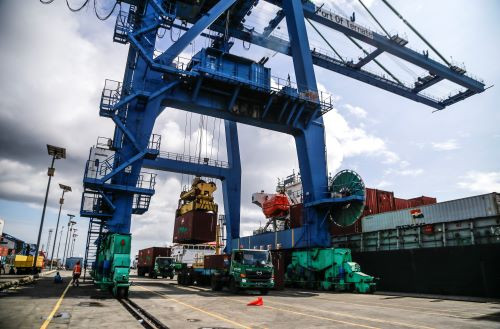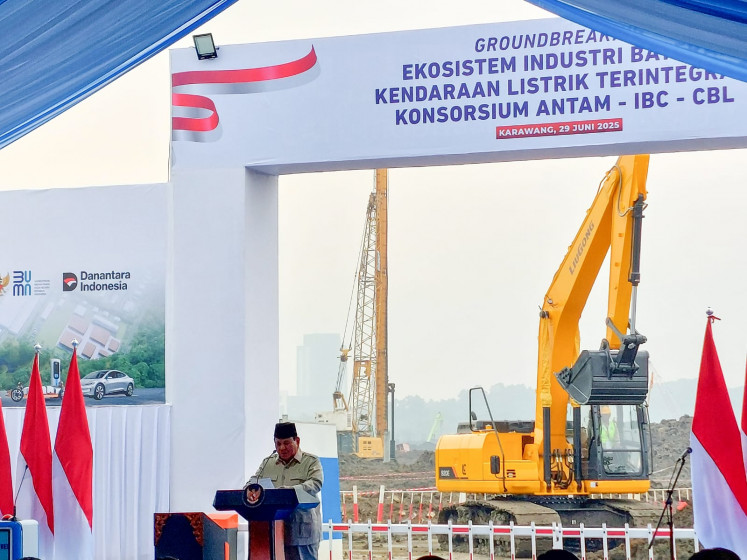Popular Reads
Top Results
Can't find what you're looking for?
View all search resultsPopular Reads
Top Results
Can't find what you're looking for?
View all search resultsLegal uncertainty, unattractive fiscal term remain major problems to lure investors
A prominent oil and gas businessman who joined a recent gathering with President Susilo Bambang Yudhoyono recalled how hard it was to convince the country’s top officials to revise regulations that he thought made oil and gas exploration in Indonesia no longer competitive
Change text size
Gift Premium Articles
to Anyone

A
prominent oil and gas businessman who joined a recent gathering with President Susilo Bambang Yudhoyono recalled how hard it was to convince the country’s top officials to revise regulations that he thought made oil and gas exploration in Indonesia no longer competitive.
During the gathering, which was attended by no more than 20 high-profile businesspeople, the President, according to the businessman, asked him what the government should do to raise investor interest in the local oil and gas industry. When the businessman asked him to consider offering a 50 percent take of oil and gas production to companies that run explorations in the eastern part of Indonesia, the President, however, expressed strong reluctance.
“You know that [such a request] is impossible,” the businessman said the President said in response to his suggestion. “If I give [the oil and gas industry] too generous fiscal terms, I will be accused of selling the country to foreign companies. You have to remember that there are many people like [political activist and the 1998 Reform movement icon] Amien Rais around me.”
The businessman said he was not surprised with the President’s answer.
“So, maybe the catalyst [to revise oil and gas regulations] is to approach people like Amien Rais first,” he said, laughing.
Despite the rising energy demand in the country, Indonesia has seen its national oil industry failing to meet the government’s production targets in the last decade.
Last year, the country produced 954,000 barrels of oil per day (bpd), lower than its production target of 965,000 bpd. This year, the government has set a target to produce 970,000 bpd but a recent report from upstream oil and gas regulatory body BPMigas showed that the country’s oil companies so far could produce no more than 920,000 bpd.
The country’s declining oil production, however, is offset slightly by increased gas production. In 2008, Indonesia produced 1.32 million barrels of oil equivalent per day (boepd) of gas and 1.41 million boepd in the following year. Last year, the production soared to 1.5 million boepd.
Although domestic gas production is predicted to increase following the ongoing development of several gas fields in the country, Indonesia is currently in dire need of finding new oil reserves as there have been no more discoveries of major oil reserves after US-based ExxonMobil found the Cepu block in Central Java more than a decade ago.
However, with various legal and fiscal uncertainties, many consider Indonesia’s oil and gas industry no longer competitive compared to those in other countries.
Last year, Canadian-based think thank the Fraser Institute ranked Indonesia’s investment climate for oil and gas number 111 out of 133 countries and territories in its Global Petroleum Survey. The institute also identified the causes of Indonesia’s poor investment climate as corruption, poor data access and that contract terms are not always honored.
Aside from those problems, many investors have also considered production sharing contracts (PSC) no longer attractive for operators.
According to the 2001 Law on Oil and Gas, oil and gas companies operate their oil and gas concessions under production sharing contracts. Normally, oil producers receive a 15 percent take of the oil production, with the remaining 85 percent going to the government.
Many investors have considered their split too low, especially deep sea areas mostly located in the
eastern part of the country. Exploration activities in the so-called frontier areas could cost them up to 10 times more than those in Java or Sumatra.
“I always believe that business opportunity [in oil and gas exploration] is still here, but it is the regulatory framework that does not support business players like us,” Hilmi Panigoro, the president commissioner of Indonesia’s largest private oil and gas firm PT Medco Energi Internasional, said recently in a discussion jointly held by the University of Indonesia’s School of Economics and Harvard University’s Kennedy School of Government.
Aside from securing exploration concessions in a number of oil and gas blocks in Indonesia, Medco is also running oil and gas exploration overseas, including in Cambodia, Libya, Oman and Tunisia.
Hilmi also urged the government to revise the current ambiguous, dispute-prone cost recovery regulation to give oil and gas companies a long-term certainty to invest in domestic explorations.
“I think the key word to attract more oil and gas investors in Indonesia is long-term legal certainty,” he said.
Under production sharing contracts, oil and gas contractors can ask for a refund for their operating costs only after they have reached the production stage. During the exploration stage, investors are also required to pay various taxes, including those imposed on the import of heavy equipment, a regulation which is uncommon in the oil and gas industry world.
National Energy Council member Widjajono Partowidagdo supported Hilmi’s view, saying that the government must start offering more fiscal incentives to investors in order to boost domestic oil and gas production.
Instead of imposing a fixed fiscal term, Widjajono said it would be better for the government to apply flexible fiscal terms for the oil and gas industry, allowing them to collect higher takes only when the economic situation was good.
“Malaysia and many other countries that have applied the flexible fiscal term have seen their oil production increasing, so why don’t we use such an approach domestically?” he said.
The relationship between the government and investors, according to Widjajono, should be treated like that between “husband and wife”.
“If the husband or wife is getting too greedy, the other will certainly leave,” he said.
The national demand for oil is estimated to stand at around 1.3 million bpd.
In order to achieve and sustain a production target of 1 million bpd, Indonesia needs to drill more than 100 wildcat wells annually, or twice the current total.
Earlier this week, BP Migas reported that 77, or 72 percent, of 107 oil and gas blocks signing contracts between 2002 and 2008 have yet to fulfill the exact commitment to conduct exploration due to various problems, including contractors’ internal problems, problems with land acquisition, the absence of supporting equipment and services and the absence of data.
According to existing regulations, contractors have a total of six years to meet their contract commitments.
“If during the period of six years they do nothing their contracts will be severed,” BP Migas spokesperson Gde Pradnyana said.
A 2006 Presidential Decree on National Energy Policy stipulates that by 2025, the contribution of new renewable energy resources — geothermal steam, biofuel, liquified coal, hydropower, nuclear, wind and biomass — should make up 17 percent of the total primary energy utilization. Oil utilization is expected to drop to 30 percent, and gas and coal to increase to 30 percent and 33 percent, respectively.









